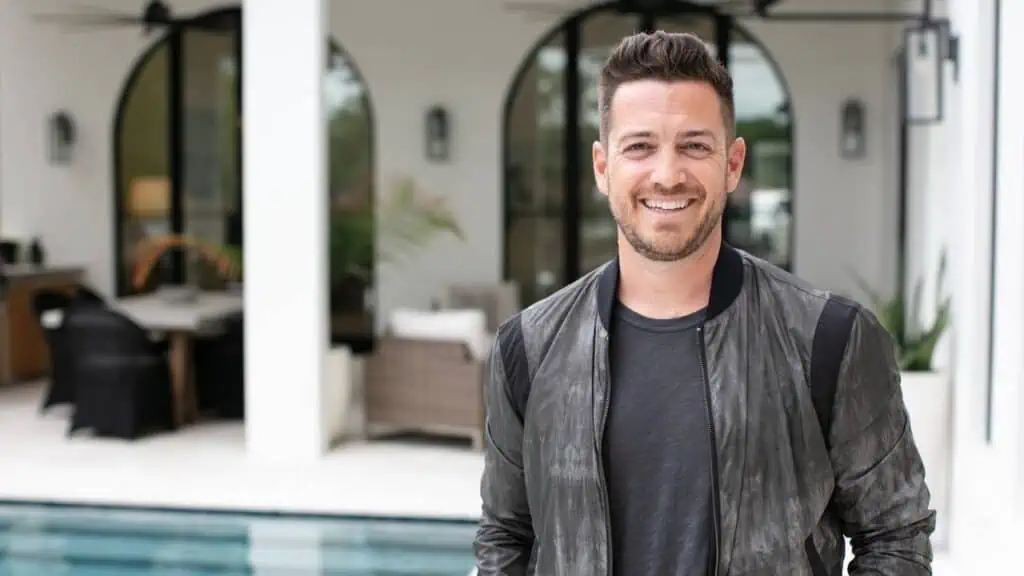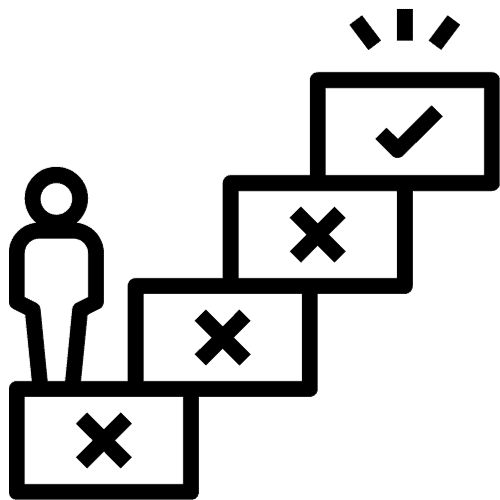How he makes $160,000 per MONTH working 5 hrs a WEEK!

Are you looking to earn an extra $1,000 per month? What about $10K?
Well, of course, but why is it we never even fathom $100k per MONTH?
Because…well, because it’s just not normal lol.
But for Graham Cochrane it is.
When I watched Graham on CNBC we had to reach out because his story is incredible! After losing his job, living on food stamps a light bulb popped on and he is now a millionaire helping thousands of people.
Listen to his story and be inspired and maybe a little light bulb will click for you as well, and who knows it might be a million dollar idea.
Enjoy!
How to turn your passion into a profitable business

1. Can you tell us a little bit about yourself and what inspired you to start your online coaching business?
I started my online business back in 2009 after losing two jobs in the Great Recession. I had a wife, a new baby, a new mortgage, and I needed to find a way to make money.
The only skill that I had was audio recording and producing albums for bands, and so I thought I would try to get some more leads for that side hustle of a freelance business. So I started a blog and eventually a YouTube channel.
Creating some content, showing people what I was doing in my little home recording studio, trying to create some credibility and some searchable content that people would find online. So they would find me, discover me, see that I had some skill and then that they might hire me.
What ended up happening was that people liked the content more than they wanted to hire me. They kept asking for more articles, more videos, and I eventually became a content creator without realizing it. And discovered the power of an online digital course and group coaching and membership sites, and I haven’t looked back since.
2. What steps did you take to research and plan for your company’s launch?
I did zero research launching my company. I literally started creating content out of necessity to create some search traffic, to get people to find out about my freelance business. I did research as I went in a way.
3. What were some of the biggest challenges you faced when starting your company? How did you overcome them?
The biggest challenge I faced when starting my business was I had no idea what I was doing. I had no roadmap for a business model. I had no idea how to monetize my content.
I didn’t even realize I was a content creator. So I spent a lot of time publishing, interacting online, finding different ways to make some money.
Without knowing that I was on the right path. It took a lot of trial and error, but then paying close attention to what was working and then doubling down on that.

4. How did you first start selling your course?
The way my first course came to be was that I was publishing a bunch of YouTube videos at the time and so many people had questions about this very specific piece of software that we use in the recording studio called Pro Tools. It’s kind of like the Photoshop of the music world.
And it’s very complicated and people seem to be very confused about it. So I wanted to create the ultimate tutorial for it. But I realized it would take three or four or five hours of video content to fully walk people through it.
And at the time YouTube only allowed me to upload 15 minute videos max. And so I figured that would take way too many YouTube videos. I decided to film it all in one big shot and see if I could sell those videos to somebody in a zipped up folder.
I didn’t realize what I was filming was a video course, but that’s exactly what I was doing. I sold it to my small email list at the time for $45, and I called it Pro Tools Bootcamp. I used a PayPal button linked to a free website I created on iWeb on my Mac, and that was how I made my first few dollars online.
5. How much do you earn with your business?
These days I earn around $160,000 per month in my business.
6. What advice would you give someone who is considering creating their own course?
If someone is considering creating their own course, the first thing I would say is don’t build a course first, build an audience first. If you don’t have an audience, you won’t have anyone to sell your course to.
If you don’t have an audience, you don’t actually know what course they want to buy. So the most powerful thing you could do to ensure that you will be successful is to create an audience online. Launch a YouTube channel, a podcast.
Certainly have a website where all of that is centralized. Begin building an email list by offering free content as a lead magnet, as a way to get their email address in exchange for some bonus piece of content. Begin building that lead.
Begin building that list. And as you grow your audience, figure out who they are, what type of content they resonate with, what questions they have, where they’re getting the most stuck, and then you will know what to build your first course around. And then when you build it, you will have people to sell it to.
Also keep in mind that length doesn’t matter. Don’t make this really long video course that you haven’t tested out with real people. Shorter is always better. Get people results faster.
People aren’t paying for a course, they’re paying for the transformation that your course can provide.
7. What strategies or techniques do you find most effective in marketing and promoting your coaching services?
The best way to sell coaching or courses or a community is to sell invisibly, meaning give away free content online, build an audience, invite them onto your email list with a lead magnet and then and then only sell them behind the scenes in an email funnel.
You can do this automatically with an Evergreen email funnel. These are pre-written emails that go out systematically day by day to all new people who join your list.
And of course, you can launch new products or launch your coaching to your list. But the selling happens behind the scenes. It’s invisible selling, don’t sell publicly, sell privately, because then you’re only selling to warm leads and you’re only selling to people who are most interested in you right now because they just joined your list.
And to everyone else, you’re just giving to the public.
8. How has your company evolved since its inception, and what lessons have you learned along the way?
I’ve run two million dollar businesses since I started 14 years ago and they’ve evolved a lot in terms of team. The core of my business hasn’t changed. Weekly content, email funnels, video courses, membership sites, coaching.
But what has evolved are some of the techniques, some of the team members. I’ve expanded to have marketing people on my team, community managers, customer service, content producers, I’ve scaled up and I’ve scaled down.
I’m coming off of a season with a bigger team and I’m going into a season with a smaller team as I try new things. But at the core, I’ve learned that you have to have a very simple business model. You have to know what drives revenue.
Don’t get distracted. Don’t try all the things because you’ll realize that most of them don’t apply to you and your business. The 80-20 rule still is critical when it comes to business. 80% of your revenue and your results are gonna come from 20% of the activities that you’re doing, so just focus on the 20%.
Stay consistent, don’t be distracted by all the new shiny objects and all the new shiny trends. Keep a simple, predictable business model.
9. Can you give an example of what a typical day looks like for you?
A typical day for me looks like waking up at 5:30, time with my Bible and coffee and prayer and journaling.
Then I make breakfast for my daughters and I take them to school. I’m in the office by around 8 o’clock and I typically exercise first. I’ll go for a long walk, like a six-mile walk, or I’ll go to the gym.
So I really technically don’t get started work until 10 30 or 11, at which point I’ll spend two to three hours max, either creating content, interviewing somebody for the podcast, building a new product, learning something new, coming up with new ideas, or I’m traveling and speaking. This year I spent a lot of time writing my new book.
But on average, I’m in the office Monday through Thursday for two to four hours, depending on what I’m working on. I always take Fridays off. Those are my date days with my wife, and weekends and nights are off as well with the family.

10. Can you share some key principles or values that have guided your company’s success and growth?
The number one value that guides my company is generosity. Give first and then people will give you their attention, their time and their hard earned money.
I never ask for money first. I always give content first that’s actionable, life changing and useful so that they can test drive me. They can test drive my brain, my knowledge, my experience, get great results in their own life.
And then that builds trust. Once I’ve built that trust and they realize that I’ve given them so much, they’re more likely to wanna give back in terms of their time, their attention, and their hard earned money.
The other value that I run my business by is less is more. I try to work as little as possible, which forces me to be as efficient as possible. I don’t want my business to run my life. I want my business to fit inside of the life that I want to live. It is a part of my life, but it is not the main part of my life.
It’s very important that I have blocked off when I’m not working and other things that are important to me and then slot work hours into the remaining spaces and not the other way around. That way I don’t work too much, get resentful, frustrate my family, get burned out. It keeps me fresh. It keeps me focused.
11. What platform/tools do you use for your business?
The primary tools I’m using for my business are riverside.fm for all my video podcasts and video recording.
From there, I’m using YouTube and Kajabi. Kajabi is my main tool for not only hosting my website, running my email marketing and my email list, hosting all my online courses and my communities, taking payment, but it’s also where I’ll do webinars, where I publish my podcast to Apple Podcasts and Spotify.
It does everything.
12. What are your future goals and aspirations for your online coaching business?
I’m moving into a season where I want to focus on writing great thought leadership books that become bestsellers and reach millions of people and keynoting on more stages.
So as I evolve my business, I’ll have more flexibility and freedom to travel and speak, spend time writing new books, and then coaching high-level entrepreneurs who want to do business and life their way.
13. Do you have any products or services you sell?
My first book is for sale, How to Get Paid for What You Know. I also have an online course called Automatic Income Academy that takes you from zero idea and zero audience to building an automated business that puts money in your pocket whether you’re working or not. And I have run membership sites and masterminds to help people scale their businesses.
14. How can others find you- as we are all fans of you now?!
You can follow my content on YouTube. The Graham Cochrane Show podcast on your favorite podcasting app or hang out with me on Instagram at @thegrahamcochrane


